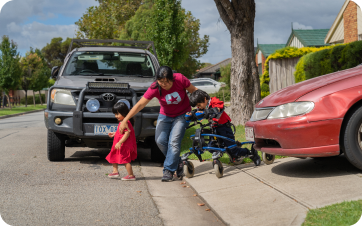Improving road safety outcomes for vulnerable children
How MACA is activating the social model approach to road safety

MACA's commitment to reducing road trauma
At MACA we believe that if we are to eliminate road trauma in Australia, we need to reach the furthest behind first. We believe that real road safety outcomes for all can only be achieved when we consider the needs of our most vulnerable.
The social model in action
By working across sectors with both traditional and nontraditional road safety stakeholders - MACA has a greater ability to influence and expand the understanding of the safe system across the community, and ultimately improve road safety outcomes for vulnerable road users and their families.

Did you know?
Children with disabilities - the road safety picture




Social model approach to road safety
Our approach to eliminating road trauma for children with disabilities and their families is based on the Social Ecological Model. This model aligns with the National Road Safety Strategy 2021-30.
This approach moves us beyond the child and family to understand, analyse and activate the broader community and societal elements of the ecology. This enables us to empower a system that meets the transport safety needs of families of children with disabilities and medical conditions.